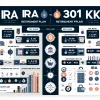
After years of hard work, it’s finally time to sleep in as much as you like. You can use all the time that you have in whatever way you find soothing. Now, who wouldn’t be excited about that? The time has almost come, and all that’s left is for human resources to resolve your paperwork.
So, before the time comes, there are still some things that you need to think about. And some of the decisions that you’ll have to make are quite important for your quality of life. Even though it may seem quite straightforward, this decision-making process can be overwhelming. Well, you can count on this article to help with that! Here, we will explain all you need to know about the important decisions that you have to make before your retirement.
Your Retirement Account – What Should You Do With It?
For most people, figuring out what to do with their retirement account is the first thing that should get resolved. The probability is high that your 401(k) or a similar retirement plan has the largest sum of your retirement funds. Having that in mind, you must decide what you’re going to do with that money. Ultimately, rolling your money over to an IRA is a logical option when it comes to your retirement accounts. Let’s talk about it in more detail.
Rolling your savings into an IRA
In general, people choose to roll their savings into an IRA as it is ultimately a simple option. Doing so makes your retirement savings way easier to manage. The main reason for this is the fact that all your money is on one account, and handling it is hence simple. Another thing regarding IRA that people find appealing is the fact that it offers more investment options.
So, if you do choose to opt for an IRA, it’s important that you think about your options regarding financial institutions. Of course, there is also an option of SDIRA (self-directed IRA). While this option is tempting and generally offers a lot of benefits, there are some things to think about first. As SDIRA advisors over at theentrustgroup.com/ira-contribution-limits explain, it is important that you do your research on SDIRA rules such as contribution limits first. So, make sure that you do your research before making any decision final!
Healthcare Plan – What Are Your Options?
Your healthcare plan is, without a doubt, one of the most important parameters that you need to figure out before retiring. The plan that you’ll conjure is heavily based on whether you’re under the age of 65 or not. So, let’s see how things change depending on that variable.
Healthcare and being under 65
There are a couple of options if you’re under 65, so, let’s talk about them. First, you should check with your employer whether you have retiree medical coverage. This can be an easy resolvement for the period until you’re 65.
If you don’t have this option, the second thing to do is to check if you can join the insurance policy of your partner. Now, you have to move quickly when it comes to this option. The reason for this is that the deadline for signing up is 30 days after the termination date regarding your job.
The third option involves the Consolidated Omnibus Budget Reconciliation Act or COBRA for simplicity. This option is useful as it allows both you and your family members to continue your health insurance. The period for which you can do so is up to 18 months after you lost your work-related coverage. It even includes dental and vision insurance! The only problem is that it can be pricey. Also, if you turn 65 before those 18 months are due, you have to apply for Medicare.
Lastly, you can choose to sign up for a Health Insurance Marketplace plan. This plan could be less pricey than COBRA, but plans vary from state to state. That being said, it would be best for you to do your research on this first.
What if you’re older than 65?
Things are way simpler for your healthcare planning if you are 65 or older. The main reason for this lies in the fact that this makes you eligible to apply for Medicare coverage. Once you sign up through your Social Security, there will be plenty of options that you can choose from. These options are mostly based on choosing a prescription drug plan, but Medicare also offers supplemental coverage if you need it. In general, it is important that you have a good overview of what you need for now before you sign up for Medicare. Having that in mind, it’s always a good idea to do your research and take time to create a plan that fits you best.

While bureaucracy and administration, in general, are never a fun thing to do, it’s still necessary. Don’t worry though, with the right information, you will be able to finish all that smoothly. After reading this article, you are already working on finding that relevant information. So, continue doing so, and don’t be afraid to ask for advice from people with experience on this topic. Good luck!







